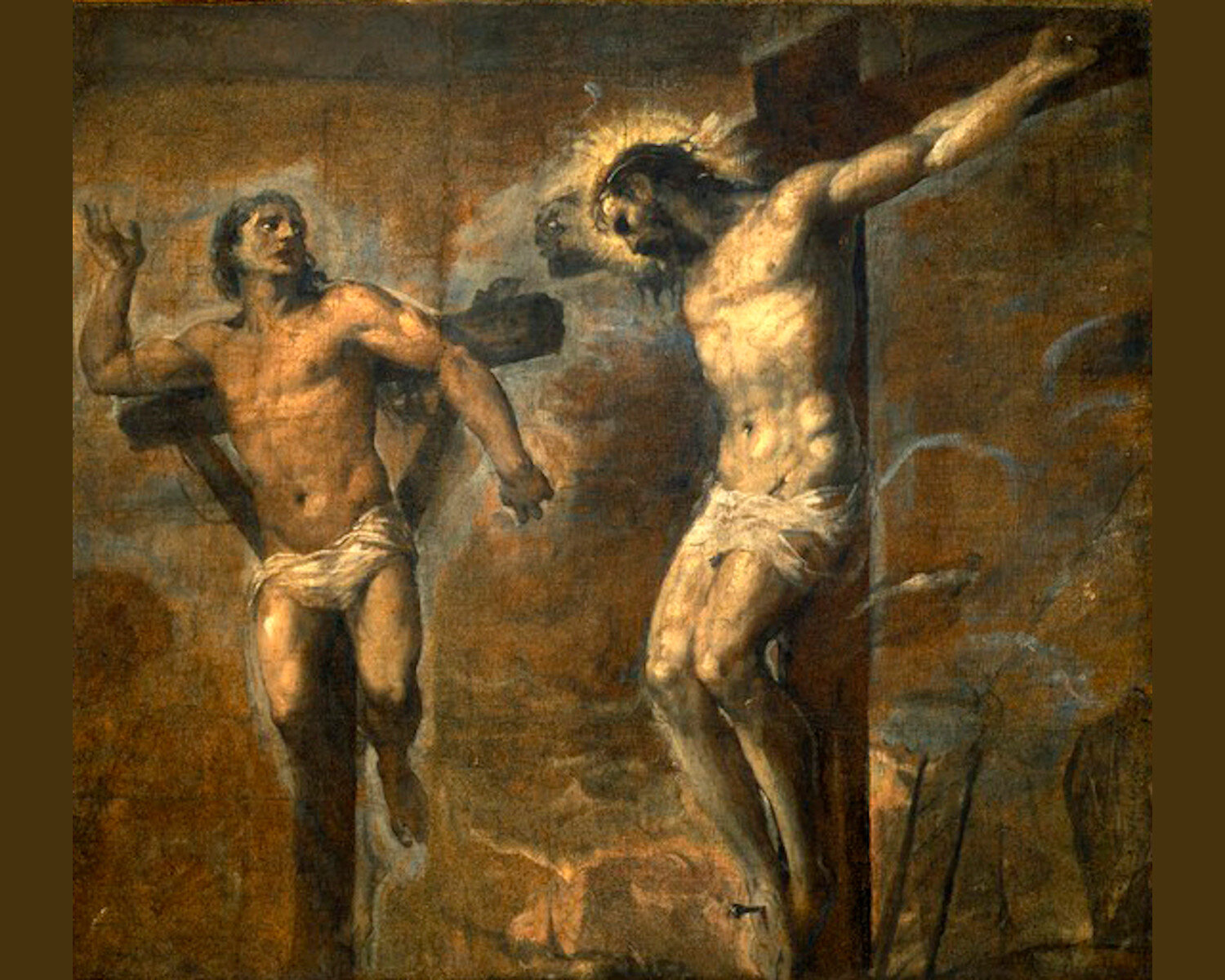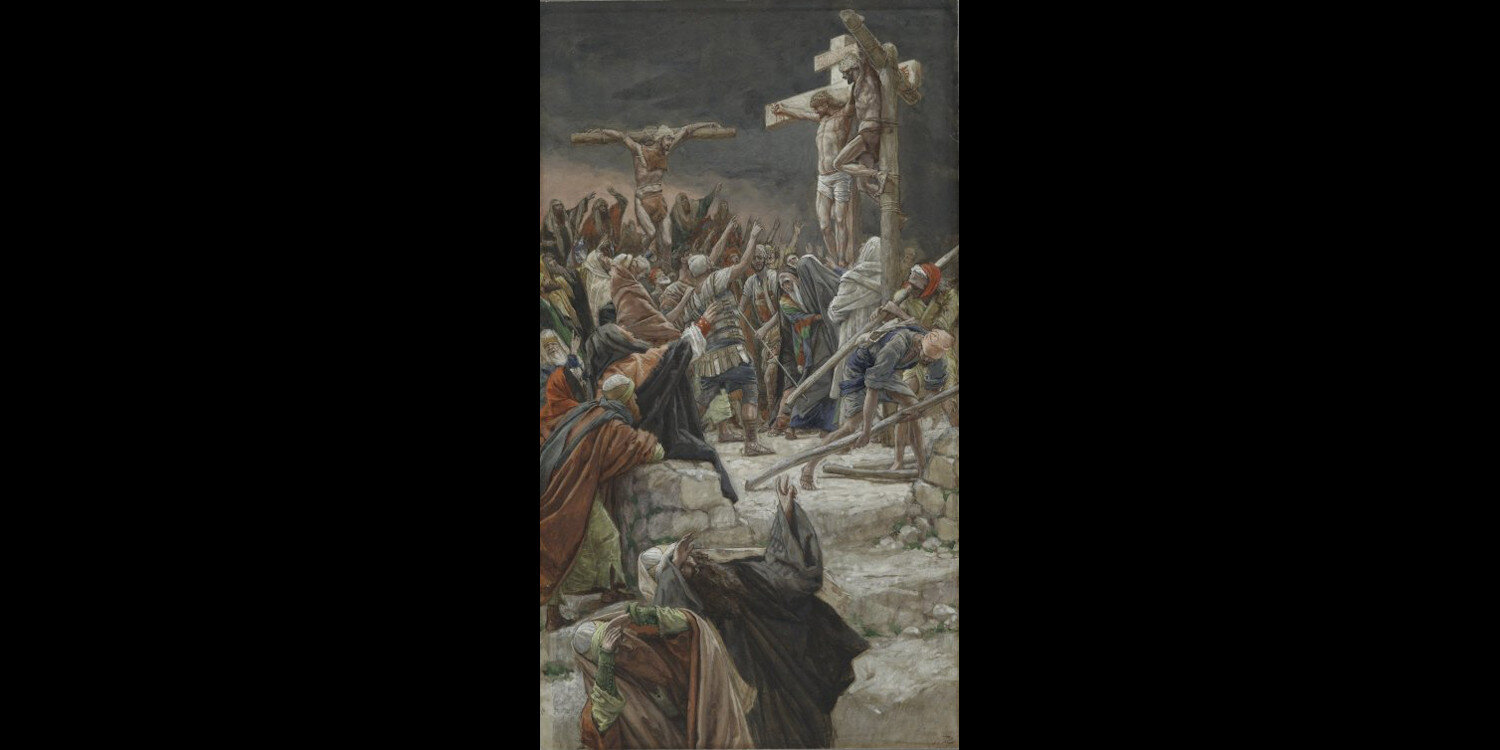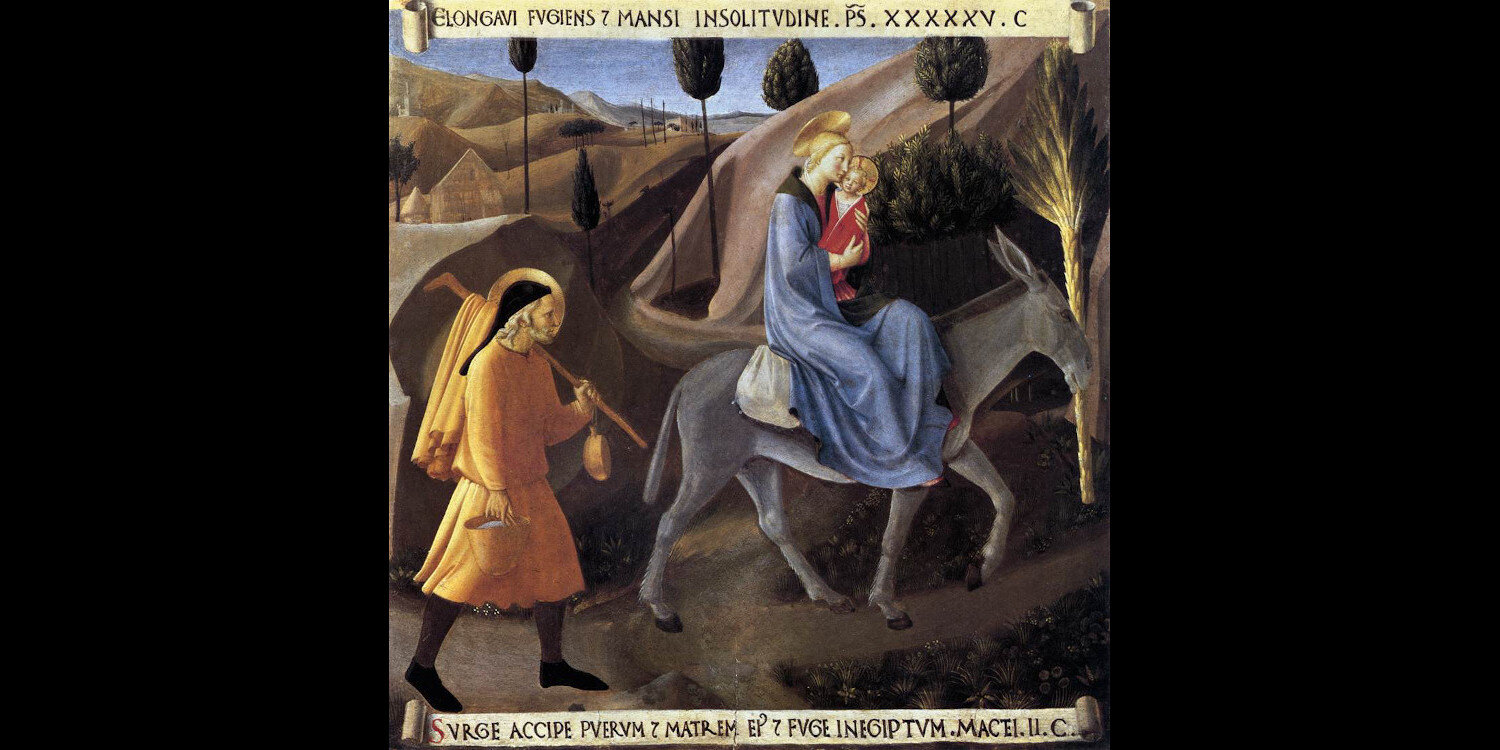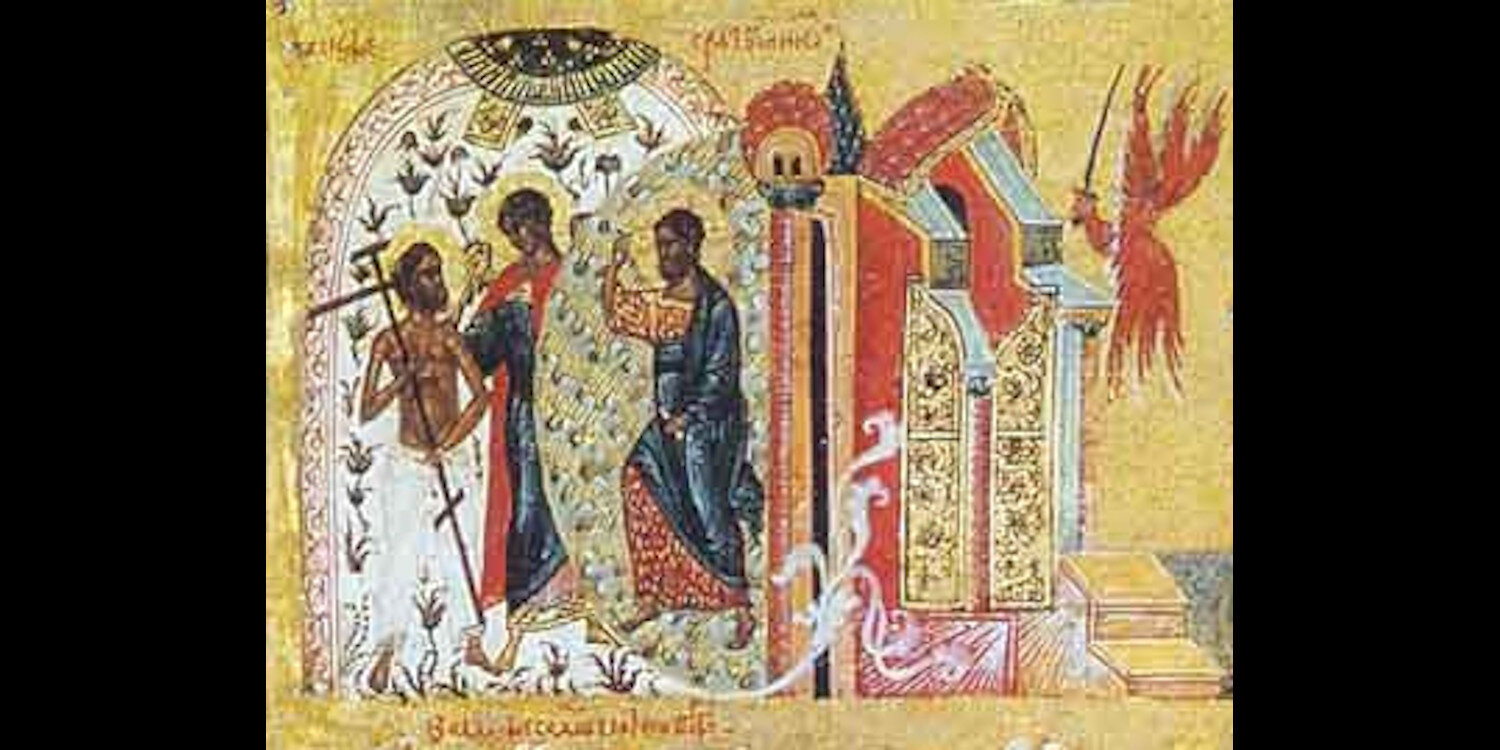Dismas, Crucified to the Right: Paradise Lost and Found
Who was Saint Dismas, the Penitent Thief, crucified to the right of Jesus at Calvary? His brief Passion Narrative appearance has deep meaning for Salvation.
“All who see me scoff at me. They mock me with parted lips; they wag their heads.”
During Holy Week one year, I wrote “Simon of Cyrene, the Scandal of the Cross, and Some Life Sight News.” It was about the man recruited by Roman soldiers to help carry the Cross of Christ. I have always been fascinated by Simon of Cyrene, but truth be told, I have no doubt that I would react with his same spontaneous revulsion if fate had me walking in his sandals that day past Mount Calvary.
Some BTSW readers might wish for a different version, but I cannot write that I would have heroically thrust the Cross of Christ upon my own back. Please rid yourselves of any such delusion. Like most of you, I have had to be dragged kicking and screaming into just about every grace I have ever endured. The only hero at Calvary was Christ. The only person worth following up that hill — up ANY hill — is Christ. I follow Him with the same burdens and trepidation and thorns in my side as you do. So don’t follow me. Follow Him.
This Holy Week, one of many behind these stone walls, has caused me to use a wider angle lens as I examine the events of that day on Mount Calvary as the Evangelists described them. This year, it is Dismas who stands out. Dismas is the name tradition gives to the man crucified to the right of the Lord, and upon whom is bestowed a dubious title: the “Good Thief.”
As I pondered the plight of Dismas at Calvary, my mind rolled some old footage, an instant replay of the day I was sent to prison — the day I felt the least priestly of all the days of my priesthood.
It was the mocking that was the worst. Upon my arrival at prison after trial late in 1994, I was fingerprinted, photographed, stripped naked, showered, and unceremoniously deloused. I didn’t bother worrying about what the food might be like, or whether I could ever sleep in such a place. I was worried only about being mocked, but there was no escaping it. As I was led from place to place in chains and restraints, my few belongings and bedding stuffed into a plastic trash bag dragged along behind me, I was greeted by a foot-stomping chant of prisoners prepped for my arrival: “Kill the priest! Kill the priest! Kill the priest!” It went on into the night. It was maddening.
It’s odd that I also remember being conscious, on that first day, of the plight of the two prisoners who had the misfortune of being sentenced on the same day I was. They are long gone now, sentenced back then to just a few years in prison. But I remember the walk from the courthouse in Keene, New Hampshire to a prison-bound van, being led in chains and restraints on the “perp-walk” past rolling news cameras. A microphone was shoved in my face: “Did you do it, Father? Are you guilty?”
You may have even witnessed some of that scene as the news footage was recently hauled out of mothballs for a WMUR-TV news clip about my new appeal. Quickly led toward the van back then, I tripped on the first step and started to fall, but the strong hands of two guards on my chains dragged me to my feet again. I climbed into the van, into an empty middle seat, and felt a pang of sorrow for the other two convicted criminals — one in the seat in front of me, and the other behind.
“Just my %¢$#@*& luck!” the one in front scowled as the cameras snapped a few shots through the van windows. I heard a groan from the one behind as he realized he might vicariously make the evening news. “No talking!” barked a guard as the van rolled off for the 90 minute ride to prison. I never saw those two men again, but as we were led through the prison door, the one behind me muttered something barely audible: “Be strong, Father.”
Revolutionary Outlaws
It was the last gesture of consolation I would hear for a long, long time. It was the last time I heard my priesthood referred to with anything but contempt for years to come. Still, to this very day, it is not Christ with whom I identify at Calvary, but Simon of Cyrene. As I wrote in “Simon of Cyrene and the Scandal of the Cross“:
“That man, Simon, is me . . . I have tried to be an Alter Christus, as priesthood requires, but on our shared road to Calvary, I relate far more to Simon of Cyrene. I pick up my own crosses reluctantly, with resentment at first, and I have to walk behind Christ for a long, long time before anything in me compels me to carry willingly what fate has saddled me with . . . I long ago had to settle for emulating Simon of Cyrene, compelled to bear the Cross in Christ’s shadow.”
So though we never hear from Simon of Cyrene again once his deed is done, I’m going to imagine that he remained there. He must have, really. How could he have willingly left? I’m going to imagine that he remained there and heard the exchange between Christ and the criminals crucified to His left and His right, and took comfort in what he heard. I heard Dismas in the young man who whispered “Be strong, Father.” But I heard him with the ears of Simon of Cyrene.
Like a Thief in the Night
Like the Magi I wrote of in “Upon a Midnight Not So Clear,” the name tradition gives to the Penitent Thief appears nowhere in Sacred Scripture. Dismas is named in a Fourth Century apocryphal manuscript called the “Acts of Pilate.” The text is similar to, and likely borrowed from, Saint Luke’s Gospel:
“And one of the robbers who were hanged, by name Gestas, said to him: ‘If you are the Christ, free yourself and us.’ And Dismas rebuked him, saying: ‘Do you not even fear God, who is in this condemnation? For we justly and deservedly received these things we endure, but he has done no evil.’”
What the Evangelists tell us of those crucified with Christ is limited. In Saint Matthew’s Gospel (27:38) the two men are simply “thieves.” In Saint Mark’s Gospel (15:27), they are also thieves, and all four Gospels describe their being crucified “one on the left and one on the right” of Jesus. Saint Mark also links them to Barabbas, guilty of murder and insurrection. The Gospel of Saint John does the same, but also identifies Barabbas as a robber. The Greek word used to identify the two thieves crucified with Jesus is a broader term than just “thief.” Its meaning would be more akin to “plunderer,” part of a roving band caught and given a death penalty under Roman law.
Only Saint Luke’s Gospel infers that the two thieves might have been a part of the Way of the Cross in which Saint Luke includes others: Simon of Cyrene carrying Jesus’ cross, and some women with whom Jesus spoke along the way. We are left to wonder what the two criminals witnessed, what interaction Simon of Cyrene might have had with them, and what they deduced from Simon being drafted to help carry the Cross of a scourged and vilified Christ.
In all of the Gospel presentations of events at Golgotha, Jesus was mocked. It is likely that he was at first mocked by both men to be crucified with him as the Gospel of St. Mark describes. But Saint Luke carefully portrays the change of heart within Dismas in his own final hour. The sense is that Dismas had no quibble with the Roman justice that had befallen him. It seems no more than what he always expected if caught:
“One of the criminals who were hanged railed at him, saying, ‘Are you not the Christ? Save yourself and us!’ But the other rebuked him, saying, ‘Do you not fear God since you are under the same sentence of condemnation? And we indeed justly, for we are receiving the due reward of our deeds; but this man has done nothing wrong.’ ”
The Flight into Egypt
The name, “Dismas” comes from the Greek for either “sunset” or “death.” In an unsubstantiated legend that circulated in the Middle Ages, in a document known as the “Arabic Gospel of the Infancy,” this encounter from atop Calvary was not the first Gestas and Dismas had with Jesus. In the legend, they were a part of a band of robbers who held up the Holy Family during the Flight into Egypt after the Magi departed in Saint Matthews Gospel (Matthew 2:13-15).
This legendary encounter in the Egyptian desert is also mentioned by Saint Augustine and Saint John Chrysostom who, having heard the same legend, described Dismas as a desert nomad, guilty of many crimes including the crime of fratricide, the murder of his own brother. This particular part of the legend, as you will see below, may have great symbolic meaning for salvation history.
In the legend, Saint Joseph, warned away from Herod by an angel (Matthew 2:13-15), opted for the danger posed by brigands over the danger posed by Herod’s pursuit. Fleeing with Mary and the child into the desert toward Egypt, they were confronted by a band of robbers led by Gestas and a young Dismas. The Holy Family looked like an unlikely target having fled in a hurry, and with very few possessions. When the robbers searched them, however, they were astonished to find expensive gifts of gold, frankincense, and myrrh — the Gifts of the Magi. However, in the legend Dismas was deeply affected by the infant, and stopped the robbery by offering a bribe to Gestas. Upon departing, the young Dismas was reported to have said:
“0 most blessed of children, if ever a time should come when I should crave thy mercy, remember me and forget not what has passed this day.”
Paradise Found
The most fascinating part of the exchange between Jesus and Dismas from their respective crosses in Saint Luke’s Gospel is an echo of that legendary exchange in the desert 33 years earlier — or perhaps the other way around:
“‘Jesus, remember me when you come into your kingly power.’ And he said to him, ‘Truly I say to you, today you will be with me in Paradise.’”
The word, “Paradise” used by Saint Luke is the Persian word, “Paradeisos” rarely used in Greek. It appears only three times in the New Testament. The first is that statement of Jesus to Dismas from the Cross in Luke 23:43. The second is in Saint Paul’s description of the place he was taken to momentarily in his conversion experience in Second Corinthians 12:3 — which I described in “The Conversion of Saint Paul and the Cost of Discipleship.” The third is the heavenly paradise that awaits the souls of the just in the Book of Revelation (2:7).
In the Old Testament, the word “Paradeisos” appears only in descriptions of the Garden of Eden in Genesis 2:8, and in the banishment of Cain after the murder of his brother, Abel:
“Cain left the presence of the Lord and wandered in the Land of Nod, East of Eden.”
Elsewhere, the word appears only in the prophets (Isaiah 51:3 and Ezekiel 36:35) as they foretold a messianic return one day to the blissful conditions of Eden — to the condition restored when God issues a pardon to man.
If the Genesis story of Cain being banished to wander “In the Land of Nod, East of Eden” is the symbolic beginning of our human alienation from God — the banishment from Eden marking an end to the State of Grace and Paradise Lost — then the Dismas profession of faith in Christ’s mercy is symbolic of Eden restored — Paradise Regained.
From the Cross, Jesus promised Dismas both a return to spiritual Eden and a restoration of the condition of spiritual adoption that existed before the Fall of Man. It’s easy to see why legends spread by the Church Fathers involved Dismas guilty of the crime of fratricide just as was Cain.
A portion of the cross upon which Dismas is said to have died alongside Christ is preserved at the Church of Santa Croce in Rome. It’s one of the Church’s most treasured relics. Catholic apologist, Jim Blackburn has proposed an intriguing twist on the exchange on the Cross between Christ and Saint Dismas. In “Dismissing the Dismas Case,” an article in the superb Catholic Answers Magazine Jim Blackburn reminded me that the Greek in which Saint Luke’s Gospel was written contains no punctuation. Punctuation had to be added in translation. Traditionally, we understand Christ’s statement to the man on the cross to his right to be:
“Truly I say to you, today you will be with me in Paradise.”
The sentence has been used by some non-Catholics (and a few Catholics) to discount a Scriptural basis for Purgatory. How could Purgatory be as necessary as I described it to be in “The Holy Longing” when even a notorious criminal is given immediate admission to Paradise? Ever the insightful thinker, Jim Blackburn proposed a simple replacement of the comma giving the verse an entirely different meaning:
“Truly I say to you today, you will be with me in Paradise.”
Whatever the timeline, the essential point could not be clearer. The door to Divine Mercy was opened by the events of that day, and the man crucified to the right of the Lord, by a simple act of faith and repentance and reliance on Divine Mercy, was shown a glimpse of Paradise Regained.
The gift of Paradise Regained left the cross of Dismas on Mount Calvary. It leaves all of our crosses there. Just as Cain set in motion our wandering “In the Land of Nod, East of Eden,” Dismas was given a new view from his cross, a view beyond death, away from the East of Eden, across the Undiscovered Country, toward eternal home.
Saint Dismas, pray for us.




